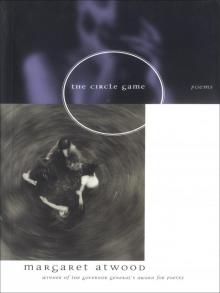- Home
- Margaret Atwood
Choke Collar: Positron, Episode Two
Choke Collar: Positron, Episode Two Read online
POSITRON | EPISODE TWO
Choke Collar
By Margaret Atwood
BYLINER SERIALS
Byliner Serials
Positron, by Margaret Atwood
Episode 1: I’m Starved for You
Purchase this episode
Episode 2: Choke Collar
Episode 3: Moppet Shop
Preorder this episode
Copyright © 2012 by Margaret Atwood
All rights reserved
Cover image: Getty/John Kuczala
ISBN: 978-1-61452-039-9
Byliner Inc.
San Francisco, California
www.byliner.com
For press inquiries, please contact [email protected]
10 9 8 7 6 5 4 3 2 1
Table of Contents
Story
Preorder Episode Three
About the Author
About Byliner
Byliner Serials
Byliner Originals & Byliner Fiction
It’s late afternoon, the December sun is low in the sky, the street is empty. Or it seems empty: as Stan has increasingly come to believe, there are eyes embedded everywhere—the lamppost, the fire hydrant—and just because you can’t see them doesn’t mean they can’t see you.
He’s trimming the hedge, making an effort to appear not only useful but cheerful. The hedge doesn’t need trimming: he trimmed it two weeks ago, and if he keeps on like this it will soon be reduced to a lattice of twiggy stubs. But he finds the activity calming, for the same reasons nail biting is calming: it’s repetitive, it imitates meaningful activity, and it’s violent.
The hedge trimmer emits a menacing whine, like a wasp’s nest that’s been stepped on. The sound gives him a fleeting illusion of power that dulls his sense of panic. Panic of a rat in a glass cage, with ample food and drink and even sex, though with no way out and the suspicion it’s part of an experiment that hasn’t taken place yet but is sure to be painful.
The source of the panic: Jocelyn, the walking vise grip. The Leatherwoman Crunch. She’s got him shackled to her ankle. He’s on her invisible leash, he’s wearing her invisible choke collar. He can’t shake her free.
Deep breath, Stan, he tells himself. You’re still fucking alive. He laughs inwardly. Or alive and fucking. Good one, Stan.
He’s got buds in his ears, hooked up to his closed-circuit Consilience cell phone. The mean whine of the trimmer plays backup to the smiley-face voice of Doris Day, whose Greatest Hits playlist serves as his daytime lullaby music. It doesn’t work completely, and he’d had an adverse reaction at first, with unwholesome fantasies of booting Doris off a rooftop, but there isn’t a lot of choice inside Consilience—they censor anything too arousing or disruptive—and he prefers her to the medley from Oklahoma or Bing Crosby singing “White Christmas.” White Christmas: now that’s a dusty notion. There hasn’t been a white Christmas for decades, and even though it’s mid-December, he hardly even needs his fleece jacket.
To the bouncy swing of “Love Me or Leave Me” he lops off a clutch of feathery cedar branches. Now that he’s used to it—that butterfat smoothness, that white-sugar overdose—it’s calming to think of Doris, ever virginal but with impressively firm bra-bolstered tits, smiling her long-ago ingenuous sun-bleached smile, mixing milkshakes in her 1950s kitchen, as in the biopic of her so often shown on Consilience TV.
She was the “nice” girl, back when the opposite was “naughty.” Something something list, checking it twice, naughty or nice: what song is that? He has a childhood memory of some muddled, alcoholic, out-of-date uncle annoying young girls by calling them naughty for wearing short skirts. That must have been around 2012; he was eleven then, and beginning to notice.
Doris would never have opted for a skirt like that. Or if she did, it would have been for something sporty and asexual, like volleyball. Maybe it was a girl like Doris he’d been wishing for when he married Charmaine. Safe, simple, clean. Ironclad in pure white undergarments. Untouchable by anyone but him. What a joke that’s turned out to be.
Let me be lonely, he hums in his head. But loneliness won’t be allowed, not once Jocelyn gets back from whatever spooky snoopy stuff she does during the day. “You should put your leather thingies on,” she said to him two nights ago, in the voice she intends to be enticing and flirtatious. “With the little screwdriver doodad. I’ll pretend you’re the plumber.” What she meant was what he’s wearing now: the leatherwork gloves, the work apron with its pockets and widgets. Kink dress-ups for men: that’s all Jocelyn sees. He hadn’t put the leather thingies on, however: he does have some pride. Though, increasingly, less.
He stands on a stepladder to reach the topmost layer of hedge. The balance is off: if he shifts he might topple, and that could be severe, because the hedge trimmer is ultrasharp. With it you could slice neatly through a neck with a lightning-swift surprise move, as in the black-and-white Japanese samurai films he used to watch online when he was a kid, along with knights in armor and monster movies and chain-saw massacres. Stan has more than once pictured Jocelyn’s head becoming detached from her body by means of edged tools.
For instance: medieval executioners could take off a head with an ax in one clean chop, at least in history flicks. Could he ever do anything that extreme? Maybe, with the drumroll and the audience of self-righteous judges and, below them, the crowd of jeering, vegetable-hurling yokels. He’d need the right accessories: the leather gloves, like the ones he has on, only with gauntlet cuffs and a leather face mask like those in twentieth-century horror films. Would his torso be bare? Better not: he needs to firm up, bulk out the muscles. He’s swilling too much of that paunch-building beer: made at Positron, tastes like piss, but anything to get drunk. Yesterday Jocelyn poked her index finger into the jelly roll over his lowest rib. “Shed that flab!” she said. It was supposed to be teasing, but there was an unspoken or else. But or else what? Though she’s never laid it on the line, Stan knows he’s on probation; but if he fails the test, whatever it is, what then?
Once I had a secret love, Doris sings. Dum de dum, me, yearning, free. Stan barely hears the words, he’s heard them so often. Wallpaper, with rosebuds on it. Would Doris Day’s life have been different if she’d called herself Doris Night? Would she have worn black lace, dyed her hair red, sung torch songs? What about Stan’s own life? Would he be thinner and fitter if his name were Phil, like Jocelyn’s cheating dipstick of a husband?
What will be will be, croons Doris. After this song finishes, next up will be the Patti Page Top Ten playlist. “How Much Is That Doggie in the Window?” Arf arf, real dog barks. That must have been cutting-edge in 1952, putting a dog into a song. Charmaine thought it was cute. Cute was a primary category for her, like right and wrong. Crocuses: cute; thunderstorms: not cute. Eggcups in the shape of chickens: cute; Stan angry: not cute. He is not cute a lot these days.
Which would be better, the ax or the hedge trimmer? he muses. The ax, if you were an expert and had the knack of the clean stroke. Otherwise—for amateurs like himself—the trimmer. The tendons would cut like wet string, but what about the bone? Would the blade snag or jam? Then there would be the blood, hitting him in the face like a water cannon. The force must be amazing when the neck is sliced like that, and the temperature much hotter than you’d expect. Soup temperature. The thought of it makes him feel a little sick. This is the problem with his fantasies: they become too vivid, then veer off into possible snafus and fuckups, and he gets tangled up in what might go wrong. So much already has.
You could do a good job on your own neck with the trimmer; though not with the ax. With the trimmer, you’d only have to position it right against the skin,
because once it was on, it would just keep going whether or not you were still conscious. He once read a true story about a guy who committed suicide in his own bed with an electric carving knife. His cheating wife was lying in the bed beside him; it was the warmth of his blood seeping into the mattress that woke her up, because he didn’t make a sound. He’s fantasized about that too—offing himself with the carving knife—because some days he feels so trapped, so hopeless, so dead-ended, so gutted and nutless that he’d do almost anything to get away.
But why is he being so negative? Honey, why are you being so negative? he hears in his head: Charmaine’s chirpy, childishly high Barbie-doll voice. Surely your life isn’t that bad! The implication being: with her in it. Stuff it, he tells the voice. The voice gives a little shocked Oh! then pops like a bubble.
But she’s right: surely his life isn’t so bad. A lot of men would be happy to trade. Every weekday he goes to his so-called work at the Consilience electric-scooter repair depot, where he’s had to fend off questions from the other guys—“What’re you doing, still here? Thought it was your month to be in Positron.” To which he replies, somewhat truthfully, “Some administration moron screwed up, seems they got my info mixed up with some other guy’s. Case of mistaken identity, but hey, I’m not complaining.”
No need to add that the other guy was Phil, the man who’d been jumping his perky, chirpy, treacherous bitch of a wife, Charmaine—snatching quickies with her in abandoned houses—and that the administration moron in question was no moron but Phil’s own wife, Jocelyn, a highly placed security-system spook. She’d tracked Phil’s every move, she’d recorded every one of his encounters with Charmaine, sometimes in sound only, sometimes in grainy and shadowy but still surprisingly erotic videos.
Stan knows the videos are surprisingly erotic because he’s watched them with Jocelyn, sitting on the exact same sofa where he used to sit with Charmaine to watch TV. Not that there was much to watch during those TV sessions: it was motivational workout shows or knitting and crafts, or two-day-old sports events, or reruns of old Hollywood classics and musicals. Or else it was the boring Town Meetings they were treated to every week to remind them how important Consilience was as a model template for the new America and how pioneering and productive and exemplary and, well, positive all its inhabitants were expected to be. That sofa with its royal blue ground and overall design of off-white lilies had signaled tedium and a comforting routine; the most he’d ever done on it with Charmaine had been hand-holding or an arm around the shoulders, because Charmaine claimed she didn’t want to do bed things except where they belonged, in a bed. A false claim, judging from the Phil-and-Charmaine videos, in which Charmaine required nothing more than a closed door and a bare floor to release her inner sidewalk whore and urge Phil to do things she’d never allowed Stan to do and say things she’d never once said to Stan.
Jocelyn likes to watch Stan watching as she smiles a tight but lip-licking smile. Then she wants him to re-create these video scenes, with her in the role of Charmaine. The horrible thing is that sometimes he can; though it’s equally horrible when he can’t. If he roughs her up and fucks her, it’s because she told him to; if he isn’t up to it, he’s a failure; so whichever it is, he loses. Jocelyn has transformed the neutral sofa with its harmless lilies to a nest of tortuous and humiliating vice. He can barely sit down on it anymore. Who knew that a man-made shape of fabric and stuffing could become such a crippling head weapon?
In addition to her yen for mindfucking and her sardonic sense of humor, Jocelyn—by virtue of her job—has tiptop coding skills and access to the Consilience/Positron database identity files. That’s how she switched Stan’s identity with her husband Phil’s, so that Stan is now Phil and Phil is Stan, at least as far as the digital tracking system is concerned.
Every month, half the people in Consilience go into Positron as prisoners and the other half come out and take up their assigned positions as guards and service personnel. The Consilience template guarantees full employment; not only that, it halves the cost of housing, since everyone is paired with an unknown Alternate who shares the same living space. One month in prison, one month out, turn and turn about. It’s the data identity system that does the tracking: you are who it says you are; you are also where it says you are.
So right now Stan is outside the Positron Prison when he should be in, whereas Charmaine and Phil are both in. No doubt Phil’s wondering what’s happened and is making ineffectual blustering noises—There’s been a mistake, I’m supposed to be leaving now, just let me contact my wife, she’s in Security, we’ll get this straightened out. Stan takes an acidic pleasure in imagining this scenario, as well as the stonewalling stares and hidden snickering among the guards, because haven’t they got their orders, which come from higher up, and don’t they know for sure that this is no mistake? Just cool it, buddy, look at the printout, it’s you all right, Positron identity numbers don’t lie, the system’s hackproof. That twisted fuckwit Phil had it coming. Holding this thought keeps Stan going during his sexual command performances with Jocelyn, which are a good deal more like tenderizing a gristly cut of steak than anything he finds purely pleasurable.
Oh, Stan! comes the pert, giggly pseudovoice of Charmaine. You get a kick out of it, you must! You do! Well, most of the time anyway, and every man has those letdown moments, but the rest of the time don’t think I can’t hear those groans and moans! It has to be enjoyable for you, don’t deny it!
Ram it, he tells her. But Charmaine, with her angel face and devious heart—the real Charmaine can’t hear him. She doesn’t yet know that Jocelyn’s been messing with their lives, hers and Stan’s—paying her back for stealing her husband, Phil—but on the first of the month she’ll find out. When she walks into this house, expecting to find Stan, it will be Phil who’ll be waiting for her. He won’t exactly be pleased about it either, would be Stan’s guess, because a quick hit of supercharged nooky snatched on the run is not at all the same as all day every day.
That’s when Charmaine will discover that the fire of her loins is not who she thinks he is—not the Max of her fever dreams, whose fake name she invokes over and over in those videos, but a much less alpha male, who will look very different in plain daylight. Saggier, older, but also jaded, shifty-eyed, calculating: you can see that in his face, on the videos. She and Phil will be stuck with each other whether they like it or not. Charmaine will have to live with his dirty socks, his hairs in the sink; she’ll have to listen to him snoring, she’ll have to make small talk with him at breakfast; all of which will put a damper on the bodice-ripping romance she’s been acting out.
How long will it take the two of them to get bored, then fed up with each other? How long before Phil resorts to domestic violence, just for something to do? Not long, Stan hopes. He wouldn’t mind knowing that Phil is smacking Charmaine around, and not just as a garnish to sex, the way he does onscreen, but for real: somebody needs to.
And Phil better not push it too far or Charmaine may stick a grapefruit knife into his jugular, since behind that blond fluff-headed act of hers there’s something skewed. A chip missing, a loose connection. He hadn’t recognized it when they’d been living together—he’d underestimated her shadow side, which was mistake number one, because everyone has a shadow side, even fluffpots like her.
But when Phil and Charmaine come out of Positron on January 1, the next switchover day, and take up domestic life in this house, what will become of him, Stan? Will Jocelyn finally tire of treating him like an indentured stud muffin, of hotwiring his mind and watching him jerk around like a galvanized frog, and send him off to Positron for a rest?
Though maybe she’ll alter the schedule even further: maybe she’ll just keep Stan here, playing her warped game of house, and let the other two cool their jets for one more month inside the slammer. Switchover day will roll round and Charmaine and Phil will be all set to put on their civvies and beeline it to their seedy rendezvous, as they’ve been in the habit
of doing over the past few months. But then some gink in a uniform will tell them there’s been a change of plans and they won’t be coming out of Positron this month. Which will mean three months straight for Phil, and two for Charmaine.
By that time Phil will have guessed that Jocelyn has found him out; he’ll be in an advanced state of anxiety if he has any sense at all. He must know his wife is a vengeful harpy, deep inside her business-suit-neutral cool. But Charmaine will be confused. She’ll run through her gamut of girly manipulations: dimpled blond astonishment, lip-quivering attempts at reasoning, tearful outrage—but none of it will do her any good. Then maybe she’ll finally have a meltdown, something Stan has never witnessed. She’ll lose it, she’ll wail, she’ll crumple to the floor. The officials won’t put up with it: they’ll haul her upright, tell her to behave; if she doesn’t, they’ll hose her down. Stan would like to see that; it would be some satisfaction for the contempt with which she’s been treating him. Maybe Jocelyn will let him watch on the spy-cam video hookup.
Not likely. His access to her Consilience spy-cam material is limited to the videos of Charmaine and Phil writhing around on the floor. Jocelyn really gets a jolt out of those. Her demand that he duplicate the action is pretty pathetic, come to think of it. Has any man ever felt any real passion for that clunky body of hers? Not him, and it shows. At those moments he’d drink paint thinner or stuff a chile pepper up his nose—anything to nuke his brain during these mutually humiliating scenes.
* * *

 Surfacing
Surfacing Hag-Seed
Hag-Seed Oryx and Crake
Oryx and Crake The Heart Goes Last
The Heart Goes Last The Handmaid's Tale
The Handmaid's Tale Lady Oracle
Lady Oracle Good Bones and Simple Murders
Good Bones and Simple Murders The Robber Bride
The Robber Bride Life Before Man
Life Before Man Alias Grace
Alias Grace The Blind Assassin
The Blind Assassin Cat's Eye
Cat's Eye The Testaments
The Testaments The Penelopiad
The Penelopiad MaddAddam
MaddAddam Dancing Girls & Other Stories
Dancing Girls & Other Stories On Writers and Writing
On Writers and Writing Selected Poems II (1976-1986)
Selected Poems II (1976-1986) Wilderness Tips
Wilderness Tips Dearly
Dearly The Tent
The Tent Bluebeard's Egg
Bluebeard's Egg The Edible Woman
The Edible Woman The Penelopiad: The Myth of Penelope and Odysseus
The Penelopiad: The Myth of Penelope and Odysseus Good Bones
Good Bones I Dream of Zenia with the Bright Red Teeth
I Dream of Zenia with the Bright Red Teeth Circle Game
Circle Game Choke Collar: Positron, Episode Two
Choke Collar: Positron, Episode Two Stone Mattress: Nine Tales
Stone Mattress: Nine Tales The MaddAddam Trilogy
The MaddAddam Trilogy Stone Mattress
Stone Mattress Power Politics
Power Politics MaddAddam 03 - MaddAddam
MaddAddam 03 - MaddAddam I’m Starved for You (Kindle Single)
I’m Starved for You (Kindle Single) Murder in the Dark
Murder in the Dark In Other Worlds
In Other Worlds Dancing Girls
Dancing Girls Moral Disorder
Moral Disorder